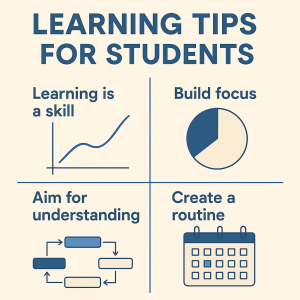For many students, school feels like a never-ending cycle of classes, tests, and expectations. One week it’s a mountain of reading; the next, a surprise quiz. As a result, many students feel overwhelmed.
Instead of powering through on autopilot, what if you learned how to actually enjoy the learning process? Becoming a better student isn’t about raw intelligence—it’s about using strategies that help your brain work smarter, not harder.
Whether you struggle in certain subjects or just want to sharpen your skills, the right mindset and habits can make all the difference. This guide explores how to learn more effectively, focus better, and build a school routine that supports both success and sanity.

Understand That Learning Is a Skill—Not Just a Task
Many students think of learning as something they have to do, not something they can get better at. But learning is a skill—just like playing an instrument or improving at a sport. The more you practice the right way, the better you become.
Rather than saying, “I’m bad at math,” try asking, “What part of math don’t I understand yet?”
And if you find yourself thinking, “I hate reading,” consider this instead: “Have I found something I like to read yet?”
This change in mindset is powerful. It helps you stay curious, try new strategies, and keep going even when things get tough. Students who believe they can improve—what psychologists call a “growth mindset”—perform better across every subject.
Start telling yourself: I’m learning how to learn. It’s okay to make mistakes. I’m getting better.
Learn How to Focus in a World Full of Distractions
Let’s be honest—school doesn’t happen in a vacuum. Phones buzz, notifications pop up, friends send memes. Distraction is everywhere, and it’s killing your ability to focus deeply. But if you can build focus, even for 20–30 minutes at a time, you’ll instantly learn faster and retain more.
Here’s how to train your focus muscle:
-
Use a timer: Try the Pomodoro method—25 minutes of study, 5 minutes break. Repeat 3–4 times.
-
Silence your phone: Or even better, leave it in another room.
-
Create a calm space: Study at a clean desk or a quiet spot at home or school. Use noise-canceling headphones or calm background music if needed.
-
Make a plan: Before starting, write down exactly what you’ll work on and what “done” looks like.
Instead, it’s about removing distractions—it’s about removing what pulls your brain in 10 directions and giving it one clear task to handle.
Replace Rote Memorization with Understanding
Cramming facts before a test might get you a short-term grade—but it rarely helps long-term. More importantly, real learning happens when you understand the why and how, not just the what.
For example, don’t just memorize that “photosynthesis uses sunlight to make glucose.” Ask:
-
Why does a plant need glucose?
-
What would happen if there were no sunlight?
-
How is this similar to something in humans?
Use techniques like diagramming or teaching aloud:
-
Summarize what you learned in your own words
-
Draw diagrams or mind maps
-
Teach the idea to a friend (or your dog!)
-
Make flashcards with questions, not just facts
When you engage with material actively, your brain makes stronger connections—and you’ll remember more with less effort.
Build Consistent (But Flexible) Routines
You don’t need to study five hours a day to succeed. What matters is being consistent. A short review every day is better than a long session once a week.
Create a simple weekly study plan:
-
Monday–Friday: 30–45 mins after school for homework/review
-
Weekend: 1–2 hours for deeper work or test prep
-
Break days: Leave time for rest and hobbies
Be flexible. Some days you’ll have sports or family plans. Don’t guilt yourself—adjust and bounce back the next day.
Having a routine also lowers stress. You stop worrying about “when will I do this?” because it’s already part of your schedule. Your brain starts expecting focus time—and that makes it easier to get into the zone.
Ask for Help the Smart Way
Asking for help is not a weakness—it’s a strength. Every good learner knows when to pause and get clarification.
But avoid vague questions like “I don’t get this.” Instead:
-
Be specific: “I don’t understand how this formula works in this example.”
-
Show what you’ve tried: “I tried solving it this way but got stuck here.”
- Respect teachers’ time—ask during appropriate moments.
Another option is to form small study groups.
A friend might explain something in a way that suddenly makes sense. In addition, helping others reinforces your own understanding. After all, teaching is a powerful form of learning.
Make Learning Personal and Meaningful
When you link schoolwork to your personal passions, it becomes easier—and way more fun.
Love sports? Study statistics in your favorite games.
Into art? Learn how geometry applies to design.
Obsessed with video games? Study how programming and logic make games work.
If a topic feels dry, ask yourself:
-
Why does this matter?
-
Where might I see this in real life?
-
Could I turn this into a project or creative assignment?
You can even reward yourself: “After I finish this essay, I’ll draw a comic version of it.” The more fun and personal school feels, the more engaged your brain becomes.
Take Care of Your Body to Boost Your Brain
It sounds obvious, but many students forget this: your brain is part of your body. Sleep, nutrition, and movement are not optional—they directly impact how you think, focus, and feel.
-
Sleep: Aim for 8–9 hours. Sleep strengthens memory and mood.
-
Water & snacks: Dehydration makes you sluggish. Keep a water bottle nearby. Choose healthy snacks like nuts, yogurt, or fruit.
-
Movement: Stretch between study sessions. Go outside. Walk, bike, or dance. Exercise actually grows parts of your brain!
Once you feel mentally tired or overwhelmed, no strategy in the world will help. Self-care is the foundation of smart learning.
Final Thoughts: You Are More Capable Than You Think
Perfection isn’t necessary. You don’t need to get straight A’s in every subject. But you can become a better, more confident learner—one step at a time.
Begin by choosing one habit from this article and trying it this week. It could be using a timer. Or perhaps summarizing in your own words. You might even start by finally getting 8 hours of sleep.
Success in school doesn’t come from magic. It comes from mindset, habits, and believing that you’re worth the effort.
So start small. Be kind to yourself. And remember—you’re not just learning for tests. You’re learning for you.
